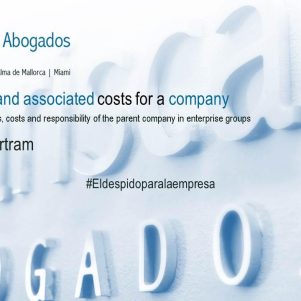Equality plans in Spain until now were only mandatory in companies with more than 250 employees. The legislative changes of recent years have been shaping their essential content while gradually reducing the threshold of employees for their mandatory implementation in companies.
Thus, as of 7 March 2021, all companies with more than 100 employees will have to implement an equality plan. As of 7 March 2022, it will be mandatory for companies with more than 50 employees.
Relevant new features of equality plans in companies
The most relevant new features of the RD 902/2020, in force in Spain since 14 January 2021, are:
- Possibility to draw up an equality plan for a group of companies: each company of the group must prepare an independent diagnosis. Subsequently, the benefit of having a single equality plan for the whole group must be justified
- Quantification of the workforce: To know whether the company is obliged to have an equality plan, it must perform a double calculation on 30 June and 31 December of each year, including:
- The entire workforce, regardless of the type of contract (permanent, temporary, permanent seasonal contract) and the nature of the relationship with the company (temporary employment company staff)
- Temporary workers whose contracts have expired in the last six months will count as one additional person for every 100 days worked in those six months.
- Deadlines to carry out the negotiation of the equality plan: The law establishes a term of three months to set up the negotiating committee as soon as the threshold of 50 workers is reached. And a period of one year for the negotiating committee to negotiate, approve and apply for registration of the equality plan.
- Negotiation procedure: Negotiations will be held with the legal representatives of workers, and when none, with the most representative trade unions and/or the most representative trade unions of the sector.
The law promotes a balanced composition of the negotiating committee, both by the company and the trade unions. - Core responsibilities of the negotiating committee:
- Carrying out the diagnosis and preparing the report with the conclusions
- Drawing up the equality plan
- Ensuring its correct implementation by identifying the priority measures and the necessary materiel and human resources
- Minimum content of the equality plan: The equality plan must determine, at least, the following points:
- The parties that agree to it
- Its scope of application
- The diagnosis report
- The results of the pay audit
- The definition of quantitative and qualitative objective
- The determination of priority measures, implementation period, and indicators
- The ascertainment of the material and human resources for its implementation.
- Duration, monitoring, and review of the equality plan: The duration of equality plans in companies will be agreed upon by the parties without exceeding four years. The creation of a supervisory board will allow the monitoring and follow-up of the equality plan.
- Registration of equality plans: The registration of equality plans in the Register of Collective Bargaining Agreements and Collective Labour Agreements is compulsory, whether there has been an agreement or not.
- Adaptation of equality plans: Companies that already have an equality plan in place will have 12 months as of 14 January 2021, to adapt it to the new RD 901/2020.
- Equality label: Companies may apply for the equality label granted by the Ministry of Equality, which will acknowledge whether the plan has been negotiated and agreed upon between the negotiating parties.
Besides the reduced thresholds of workers for its mandatory implementation, equality plans in companies in Spain consider other vital issues. Namely, the quantification of staff, the adaptation of the equality plans in force, and the creation and training of teams within the company, fully or partially dedicated to equality plans, their monitoring, control, and review.
Belén Crego
If your need information about equality plans in companies in Spain,





